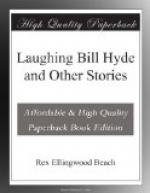What hit the old man hardest was the fact that he could not explain to his associates—that he could not even explain to himself, for that matter. He could make neither head nor tail of the affair; his son was on the high seas and could not be reached; the mystery of the whole transaction threatened to unseat his reason. Even when his sorrowing heir arrived, a week after the shock, the father could gather nothing at first except the bare details.
All he could learn was that the Royal Barrata Bridge Commission had met on the twenty-fifth day of May, for the second time in its history, with Sir Thomas Drummond in the chair. In the midst of an ultra-British solemnity the bids had been opened and read—nine of them—two Belgian, one German, two French, one English, one Scottish, and two American.
The only proposals that conformed to the specifications in every respect were the last named. They were perfect. The Atlantic Bridge Company, of Newark, New Jersey, offered to do the work as specified for L1,600,000 sterling. The Patterson Bridge Company, through its authorized agent, Mr. Henry Hanford, named a price of L1,550,000. The rest was but a matter of detail.
Having concluded this bald recital, Jackson Wylie, the Second, spread his hands in a gesture of despair. “I can’t understand it,” he said, dolefully. “I thought I had it cinched all the time.”
“You had it cinched!” bellowed his father. “You! Why, you ruined it all! Why in hell did you send him over here?”
“I? Send who? What are you talking about?”
“That man with the boots! That lying, thieving scoundrel, Sir Thomas Drummond, of course.”
The younger Wylie’s face showed blank, uncomprehending amazement. “Sir Thomas Drummond was in London all the time I was there. I saw him daily,” said he.
Not until this very moment did the president of the Atlantic Bridge Company comprehend the trap he had walked into, but now the whole hideous business became apparent. He had been fooled, swindled, and in a way to render recourse impossible; nay, in a manner to blacken his reputation if the story became public. He fell actually ill from the passion of his rage and not even a long rest from the worries of business completely cured him. The bitter taste of defeat would not down. He might never have understood the matter thoroughly had it not been for a missive he received one day through the mail. It was a bill from a London shoe-store for twelve pairs of boots, of varying styles, made out to Henry Hanford, and marked “paid.”
Mr. Jackson Wylie, Sr., noted with unspeakable chagrin that the last word was heavily under-scored in ink, as if by another hand. Hanford’s bill was indeed paid, and with interest to date.




